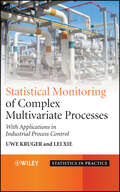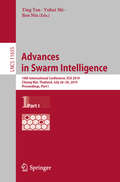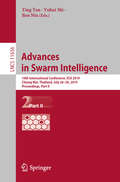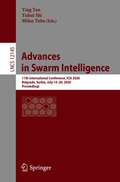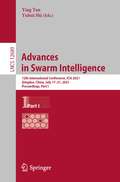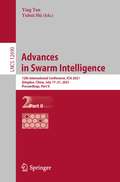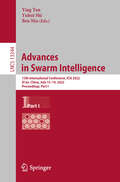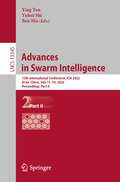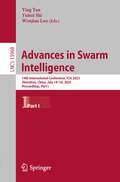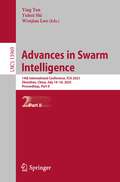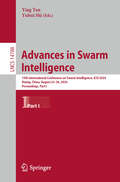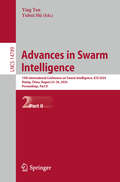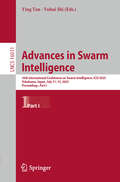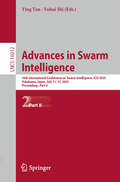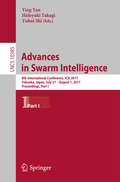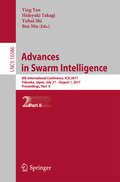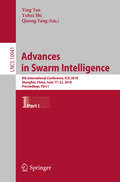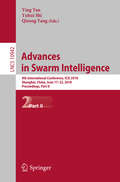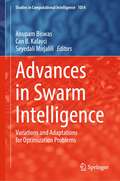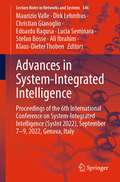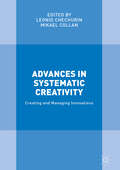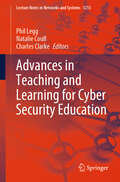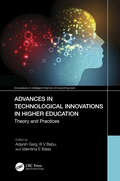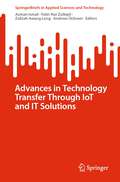- Table View
- List View
Advances in Statistical Monitoring of Complex Multivariate Processes
by Uwe Kruger Lei XieThe development and application of multivariate statistical techniques in process monitoring has gained substantial interest over the past two decades in academia and industry alike. Initially developed for monitoring and fault diagnosis in complex systems, such techniques have been refined and applied in various engineering areas, for example mechanical and manufacturing, chemical, electrical and electronic, and power engineering. The recipe for the tremendous interest in multivariate statistical techniques lies in its simplicity and adaptability for developing monitoring applications. In contrast, competitive model, signal or knowledge based techniques showed their potential only whenever cost-benefit economics have justified the required effort in developing applications.Statistical Monitoring of Complex Multivariate Processes presents recent advances in statistics based process monitoring, explaining how these processes can now be used in areas such as mechanical and manufacturing engineering for example, in addition to the traditional chemical industry.This book:Contains a detailed theoretical background of the component technology.Brings together a large body of work to address the field's drawbacks, and develops methods for their improvement.Details cross-disciplinary utilization, exemplified by examples in chemical, mechanical and manufacturing engineering.Presents real life industrial applications, outlining deficiencies in the methodology and how to address them.Includes numerous examples, tutorial questions and homework assignments in the form of individual and team-based projects, to enhance the learning experience.Features a supplementary website including Matlab algorithms and data sets.This book provides a timely reference text to the rapidly evolving area of multivariate statistical analysis for academics, advanced level students, and practitioners alike.
Advances in Swarm Intelligence: 10th International Conference, ICSI 2019, Chiang Mai, Thailand, July 26–30, 2019, Proceedings, Part I (Lecture Notes in Computer Science #11655)
by Ying Tan Ben Niu Yuhui ShiThe two-volume set of LNCS 11655 and 11656 constitutes the proceedings of the 10th International Conference on Advances in Swarm Intelligence, ICSI 2019, held in Chiang Mai, Thailand, in June 2019. The total of 82 papers presented in these volumes was carefully reviewed and selected from 179 submissions. The papers were organized in topical sections as follows:Part I: Novel methods and algorithms for optimization; particle swarm optimization; ant colony optimization; fireworks algorithms and brain storm optimization; swarm intelligence algorithms and improvements; genetic algorithm and differential evolution; swarm robotics. Part II: Multi-agent system; multi-objective optimization; neural networks; machine learning; identification and recognition; social computing and knowledge graph; service quality and energy management.
Advances in Swarm Intelligence: 10th International Conference, ICSI 2019, Chiang Mai, Thailand, July 26–30, 2019, Proceedings, Part II (Lecture Notes in Computer Science #11656)
by Ying Tan Ben Niu Yuhui ShiThe two-volume set of LNCS 11655 and 11656 constitutes the proceedings of the 10th International Conference on Advances in Swarm Intelligence, ICSI 2019, held in Chiang Mai, Thailand, in June 2019. The total of 82 papers presented in these volumes was carefully reviewed and selected from 179 submissions. The papers were organized in topical sections as follows: Part I: Novel methods and algorithms for optimization; particle swarm optimization; ant colony optimization; fireworks algorithms and brain storm optimization; swarm intelligence algorithms and improvements; genetic algorithm and differential evolution; swarm robotics. Part II: Multi-agent system; multi-objective optimization; neural networks; machine learning; identification and recognition; social computing and knowledge graph; service quality and energy management.
Advances in Swarm Intelligence: 11th International Conference, ICSI 2020, Belgrade, Serbia, July 14–20, 2020, Proceedings (Lecture Notes in Computer Science #12145)
by Ying Tan Yuhui Shi Milan TubaThis book constitutes the proceedings of the 11th International Conference on Advances in Swarm Intelligence, ICSI 2020, held in July 2020 in Belgrade, Serbia. Due to the COVID-19 pandemic the conference was held virtually. The 63 papers included in this volume were carefully reviewed and selected from 127 submissions. The papers are organized in 12 cohesive topical sections as follows: Swarm intelligence and nature-inspired computing; swarm-based computing algorithms for optimization; particle swarm optimization; ant colony optimization; brain storm optimization algorithm; bacterial foraging optimization; genetic algorithm and evolutionary computation; multi-objective optimization; machine learning; data mining; multi-agent system and robotic swarm, and other applications.
Advances in Swarm Intelligence: 12th International Conference, ICSI 2021, Qingdao, China, July 17–21, 2021, Proceedings, Part I (Lecture Notes in Computer Science #12689)
by Ying Tan Yuhui Shihis two-volume set LNCS 12689-12690 constitutes the refereed proceedings of the 12th International Conference on Advances in Swarm Intelligence, ICSI 2021, held in Qingdao, China, in July 2021. The 104 full papers presented in this volume were carefully reviewed and selected from 177 submissions. They cover topics such as: Swarm Intelligence and Nature-Inspired Computing; Swarm-based Computing Algorithms for Optimization; Particle Swarm Optimization; Ant Colony Optimization; Differential Evolution; Genetic Algorithm and Evolutionary Computation; Fireworks Algorithms; Brain Storm Optimization Algorithm; Bacterial Foraging Optimization Algorithm; DNA Computing Methods; Multi-Objective Optimization; Swarm Robotics and Multi-Agent System; UAV Cooperation and Control; Machine Learning; Data Mining; and Other Applications.
Advances in Swarm Intelligence: 12th International Conference, ICSI 2021, Qingdao, China, July 17–21, 2021, Proceedings, Part II (Lecture Notes in Computer Science #12690)
by Ying Tan Yuhui Shihis two-volume set LNCS 12689-12690 constitutes the refereed proceedings of the 12th International Conference on Advances in Swarm Intelligence, ICSI 2021, held in Qingdao, China, in July 2021. The 104 full papers presented in this volume were carefully reviewed and selected from 177 submissions. They cover topics such as: Swarm Intelligence and Nature-Inspired Computing; Swarm-based Computing Algorithms for Optimization; Particle Swarm Optimization; Ant Colony Optimization; Differential Evolution; Genetic Algorithm and Evolutionary Computation; Fireworks Algorithms; Brain Storm Optimization Algorithm; Bacterial Foraging Optimization Algorithm; DNA Computing Methods; Multi-Objective Optimization; Swarm Robotics and Multi-Agent System; UAV Cooperation and Control; Machine Learning; Data Mining; and Other Applications.
Advances in Swarm Intelligence: 13th International Conference, ICSI 2022, Xi'an, China, July 15–19, 2022, Proceedings, Part I (Lecture Notes in Computer Science #13344)
by Ying Tan Ben Niu Yuhui ShiThis two-volume set LNCS 13344 and 13345 constitutes the proceedings of the 13th International Conference on Advances in Swarm Intelligence, ICSI 2022, which took place in Xi’an, China, in July 2022. The theme of this year’s conference was “Serving Life with Swarm Intelligence”.The 85 full papers presented were carefully reviewed and selected from 171 submissions. The papers of the first part cover topics such as: Swarm Intelligence and Nature-Inspired Computing; Swarm-based Computing Algorithms for Optimization; Particle Swarm Optimization; Ant Colony Optimization; Differential Evolution; Genetic Algorithm and Evolutionary Computation; Fireworks Algorithms; Brain Storm Optimization Algorithm; Bacterial Foraging Optimization Algorithm; DNA Computing Methods; Multi-Objective Optimization; Swarm Robotics and Multi-Agent System; UAV Cooperation and Control; Machine Learning; Data Mining; and Other Applications.
Advances in Swarm Intelligence: 13th International Conference, ICSI 2022, Xi'an, China, July 15–19, 2022, Proceedings, Part II (Lecture Notes in Computer Science #13345)
by Ying Tan Ben Niu Yuhui ShiThis two-volume set LNCS 13344 and 13345 constitutes the proceedings of the 13th International Conference on Advances in Swarm Intelligence, ICSI 2022, which took place in Xi’an, China, in July 2022. The theme of this year’s conference was “Serving Life with Swarm Intelligence”. The 85 full papers presented were carefully reviewed and selected from 171 submissions. The papers of the second part cover topics such as: Swarm Robotics and Multi-agent System; Deep Neural Networks; Machine Learning; Data Mining; Other Optimization Applications; ICSI-OC’2022: Competition on Single Objective Bounded Optimization Problems; Swarm Intelligence and Nature-Inspired Computing; Swarm-based Computing Algorithms for Optimization; Particle Swarm Optimization; Ant Colony Optimization; Genetic Algorithm and Evolutionary Computation; Fireworks Algorithms; Brain Storm Optimization Algorithm; Swarm Intelligence Approach-based Applications; Multi-Objective Optimization.
Advances in Swarm Intelligence: 14th International Conference, ICSI 2023, Shenzhen, China, July 14–18, 2023, Proceedings, Part I (Lecture Notes in Computer Science #13968)
by Ying Tan Yuhui Shi Wenjian LuoThis two-volume set LNCS 13968 and 13969 constitutes the proceedings of the 14th International Conference on Advances in Swarm Intelligence, ICSI 2023, which took place in Shenzhen, China, China, in July 2023. The theme of this year’s conference was “Serving Life with Swarm Intelligence”.The 81 full papers presented were carefully reviewed and selected from 170 submissions. The papers are organized into 12 cohesive sections covering major topics of swarm intelligence research and its development and applications. The papers of the first part cover topics such as: Swarm Intelligence Computing; Swarm Intelligence Optimization Algorithms; Particle Swarm Optimization Algorithms; Genetic Algorithms; Optimization Computing Algorithms; Neural Network Search & Large-Scale Optimization; Multi-objective Optimization.
Advances in Swarm Intelligence: 14th International Conference, ICSI 2023, Shenzhen, China, July 14–18, 2023, Proceedings, Part II (Lecture Notes in Computer Science #13969)
by Ying Tan Yuhui Shi Wenjian LuoThis two-volume set LNCS 13968 and 13969 constitutes the proceedings of the 14th International Conference on Advances in Swarm Intelligence, ICSI 2023, which took place in Shenzhen, China, China, in July 2023. The theme of this year’s conference was “Serving Life with Swarm Intelligence”. The 81 full papers presented were carefully reviewed and selected from 170 submissions. The papers are organized into 12 cohesive sections covering major topics of swarm intelligence research and its development and applications. The papers of the second part cover topics such as: Swarm Robotics and UAV; Machine Learning; Data Mining; Routing and Scheduling Problems; Stock Prediction and Portfolio Optimization; ICSI-Optimization Competition.
Advances in Swarm Intelligence: 15th International Conference on Swarm Intelligence, ICSI 2024, Xining, China, August 23–26, 2024, Proceedings, Part I (Lecture Notes in Computer Science #14788)
by Ying Tan Yuhui ShiThis two-volume set LNCS 14788 and 14789 constitutes the refereed post-conference proceedings of the 15th International Conference on Advances in Swarm Intelligence, ICSI 2024, held in Xining, China, during August 23–26, 2024. The 74 revised full papers presented in these proceedings were carefully reviewed and selected from 156 submissions. The papers are organized in the following topical sections: Part I - Particle swarm optimization; Swarm intelligence computing; Differential evolution; Evolutionary algorithms; Multi-agent reinforcement learning & Multi-objective optimization. Part II - Route planning problem; Machine learning; Detection and prediction; Classification; Edge computing; Modeling and optimization & Analysis of review.
Advances in Swarm Intelligence: 15th International Conference on Swarm Intelligence, ICSI 2024, Xining, China, August 23–26, 2024, Proceedings, Part II (Lecture Notes in Computer Science #14789)
by Ying Tan Yuhui ShiThis two-volume set LNCS 14788 and 14789 constitutes the refereed post-conference proceedings of the 15th International Conference on Advances in Swarm Intelligence, ICSI 2024, held in Xining, China, during August 23–26, 2024. The 74 revised full papers presented in these proceedings were carefully reviewed and selected from 156 submissions. The papers are organized in the following topical sections: Part I - Particle swarm optimization; Swarm intelligence computing; Differential evolution; Evolutionary algorithms; Multi-agent reinforcement learning & Multi-objective optimization. Part II - Route planning problem; Machine learning; Detection and prediction; Classification; Edge computing; Modeling and optimization & Analysis of review.
Advances in Swarm Intelligence: 16th International Conference on Swarm Intelligence, ICSI 2025, Yokohama, Japan, July 11–15, 2025, Proceedings, Part I (Lecture Notes in Computer Science #16011)
by Ying Tan Yuhui ShiThis two-volume set LNCS 16011 and 16012 constitutes the refereed post-conference proceedings of the 16th International Conference on Advances in Swarm Intelligence, ICSI 2025, held in Yokohama, Japan, during July 11-15, 2025. The 54 revised full papers presented in these proceedings were carefully reviewed and selected from 116 submissions. The papers are organized in the following topical sections: Particle Swarm Optimization; Swarm Optimization Algorithms; Swarm of Large Language Models; Agent and Multi-agents; Vehicle Routing; Multiobjective Optimization; Approaches for Classification and Feature Selection; Prediction and Detection Algorithms; Machine Learning.
Advances in Swarm Intelligence: 16th International Conference on Swarm Intelligence, ICSI 2025, Yokohama, Japan, July 11–15, 2025, Proceedings, Part II (Lecture Notes in Computer Science #16012)
by Ying Tan Yuhui ShiThis two-volume set LNCS 16011 and 16012 constitutes the refereed post-conference proceedings of the 16th International Conference on Advances in Swarm Intelligence, ICSI 2025, held in Yokohama, Japan, during July 11-15, 2025. The 54 revised full papers presented in these proceedings were carefully reviewed and selected from 116 submissions. The papers are organized in the following topical sections: Particle Swarm Optimization; Swarm Optimization Algorithms; Swarm of Large Language Models; Agent and Multi-agents; Vehicle Routing; Multiobjective Optimization; Approaches for Classification and Feature Selection; Prediction and Detection Algorithms; Machine Learning.
Advances in Swarm Intelligence: 8th International Conference, ICSI 2017, Fukuoka, Japan, July 27 – August 1, 2017, Proceedings, Part I (Lecture Notes in Computer Science #10385)
by Ying Tan, Hideyuki Takagi and Yuhui ShiThe two-volume set of LNCS 10385 and 10386, constitutes the proceedings of the 8th International Confrence on Advances in Swarm Intelligence, ICSI 2017, held in Fukuoka, Japan, in July/August 2017. The total of 133 papers presented in these volumes was carefully reviewed and selected from 267 submissions. The paper were organized in topical sections as follows:Part I: theories and models of swarm intelligence; novel swarm-based optimization algorithms; particle swarm optimization; applications of particle swarm optimization; ant colony optimization; artificial bee colony algorithms; genetic algorithms; differential evolution; fireworks algorithm; brain storm optimization algorithm; cuckoo searh; and firefly algorithm. Part II: multi-objective optimization; portfolio optimization; community detection; multi-agent systems and swarm robotics; hybrid optimization algorithms and applications; fuzzy and swarm approach; clustering and forecast; classification and detection; planning and routing problems; dialog system applications; robotic control; and other applications.
Advances in Swarm Intelligence: 8th International Conference, ICSI 2017, Fukuoka, Japan, July 27 – August 1, 2017, Proceedings, Part II (Lecture Notes in Computer Science #10386)
by Ying Tan, Hideyuki Takagi, Yuhui Shi and Ben NiuThe two-volume set of LNCS 10385 and 10386, constitutes the proceedings of the 8th International Conference on Advances in Swarm Intelligence, ICSI 2017, held in Fukuoka, Japan, in July/August 2017. The total of 133 papers presented in these volumes was carefully reviewed and selected from 267 submissions. The paper were organized in topical sections as follows:Part I: theories and models of swarm intelligence; novel swarm-based optimization algorithms; particle swarm optimization; applications of particle swarm optimization; ant colony optimization; artificial bee colony algorithms; genetic algorithms; differential evolution; fireworks algorithm; brain storm optimization algorithm; cuckoo searh; and firefly algorithm. Part II: multi-objective optimization; portfolio optimization; community detection; multi-agent systems and swarm robotics; hybrid optimization algorithms and applications; fuzzy and swarm approach; clustering and forecast; classification and detection; planning and routing problems; dialog system applications; robotic control; and other applications.
Advances in Swarm Intelligence: 9th International Conference, ICSI 2018, Shanghai, China, June 17-22, 2018, Proceedings, Part I (Lecture Notes in Computer Science #10941)
by Ying Tan Yuhui Shi Qirong TangThe two-volume set of LNCS 10941 and 10942 constitutes the proceedings of the 9th International Conference on Advances in Swarm Intelligence, ICSI 2018, held in Shanghai, China, in June 2018. The total of 113 papers presented in these volumes was carefully reviewed and selected from 197 submissions. The papers were organized in topical sections as follows: theories and models of swarm intelligence; ant colony optimization; particle swarm optimization; artificial bee colony algorithms; genetic algorithms; differential evolution; fireworks algorithms; bacterial foraging optimization; artificial immune system; hydrologic cycle optimization; other swarm-based optimization algorithms; hybrid optimization algorithms; multi-objective optimization; large-scale global optimization; multi-agent systems; swarm robotics; fuzzy logic approaches; planning and routing problems; recommendation in social media; prediction, classification; finding patterns; image enhancement; deep learning.
Advances in Swarm Intelligence: 9th International Conference, ICSI 2018, Shanghai, China, June 17-22, 2018, Proceedings, Part II (Lecture Notes in Computer Science #10942)
by Ying Tan Yuhui Shi Qirong TangThe two-volume set of LNCS 10941 and 10942 constitutes the proceedings of the 9th International Conference on Advances in Swarm Intelligence, ICSI 2018, held in Shanghai, China, in June 2018. The total of 113 papers presented in these volumes was carefully reviewed and selected from 197 submissions. The papers were organized in topical sections namely: multi-agent systems; swarm robotics; fuzzy logic approaches; planning and routing problems; recommendation in social media; predication; classification; finding patterns; image enhancement; deep learning; theories and models of swarm intelligence; ant colony optimization; particle swarm optimization; artificial bee colony algorithms; genetic algorithms; differential evolution; fireworks algorithm; bacterial foraging optimization; artificial immune system; hydrologic cycle optimization; other swarm-based optimization algorithms; hybrid optimization algorithms; multi-objective optimization; large-scale global optimization.
Advances in Swarm Intelligence: 9th International Conference, ICSI 2018, Shanghai, China, June 17-22, 2018, Proceedings, Part II (Lecture Notes in Computer Science #10942)
by Ying Tan Yuhui Shi Qirong TangThe two-volume set of LNCS 10941 and 10942 constitutes the proceedings of the 9th International Conference on Advances in Swarm Intelligence, ICSI 2018, held in Shanghai, China, in June 2018. The total of 113 papers presented in these volumes was carefully reviewed and selected from 197 submissions. The papers were organized in topical sections namely: multi-agent systems; swarm robotics; fuzzy logic approaches; planning and routing problems; recommendation in social media; predication; classification; finding patterns; image enhancement; deep learning; theories and models of swarm intelligence; ant colony optimization; particle swarm optimization; artificial bee colony algorithms; genetic algorithms; differential evolution; fireworks algorithm; bacterial foraging optimization; artificial immune system; hydrologic cycle optimization; other swarm-based optimization algorithms; hybrid optimization algorithms; multi-objective optimization; large-scale global optimization.
Advances in Swarm Intelligence: Variations and Adaptations for Optimization Problems (Studies in Computational Intelligence #1054)
by Seyedali Mirjalili Anupam Biswas Can B. KalayciSwarm Intelligence (SI) has grown significantly, both from the perspective of algorithmic development and applications covering almost all disciplines science and technology. This book emphasizes the studies of existing SI techniques, their variants and applications. The book also contains reviews of new developments in SI techniques and hybridizations. Algorithm specific studies covering basic introduction and analysis of key components of these algorithms, such as convergence, balance of solution accuracy, computational costs, tuning and control of parameters. Application specific studies incorporating the ways of designing objective functions, solution representation and constraint handling. The book also includes studies on application domain specific adaptations in the SI techniques. The book will be beneficial for academicians and researchers from various disciplines of engineering and science working in applications of SI and other optimization problems.
Advances in System-Integrated Intelligence: Proceedings of the 6th International Conference on System-Integrated Intelligence (SysInt 2022), September 7-9, 2022, Genova, Italy (Lecture Notes in Networks and Systems #546)
by Dirk Lehmhus Maurizio Valle Klaus-Dieter Thoben Stefan Bosse Ali Ibrahim Christian Gianoglio Edoardo Ragusa Lucia SeminaraThis book reports on cutting-edge research and developments focusing on integrating intelligent functionalities into materials, components, systems and products. Gathering the proceedings of the 6th International Conference on System-Integrated Intelligence (SysInt 2022), held on September 7-9, in Genova, Italy, it offers a comprehensive, multidisciplinary and applied perspective on the state-of-the art and challenges in the field of intelligent, flexible and connected systems. The book covers advanced methods and applications relating to artificial, pervasive and ubiquitous intelligence, sensors, smart factory and logistics, structural health monitoring, as well as soft robotics, cognitive systems and human-machine interaction. Giving a special focus to artificial intelligence, it extensively reports on methods and algorithms for data-driven modeling, and agent-based data processing and planning. It aims at inspiring and fostering collaboration between researchers and professionals from the different fields of electrical, manufacturing and production engineering, and materials and computer sciences.
Advances in Systematic Creativity: Creating and Managing Innovations
by Mikael Collan Leonid ChechurinThis book presents a collection of the most current research into systemic creativity and TRIZ, engendering discussion and the exchange of new discoveries in the field. With chapters on idea generation, decision making, creativity support tools, artificial intelligence and literature based discovery, it will include a number of instruments of inventive design automation. Consisting of 15-20 chapters written by leading experts in the theory for inventive problem solving (TRIZ) and adjacent fields focused upon heuristics, the contributions will add to the method of inventive design, dialogue with other tools and methods, and teaching creativity in management education through real-life case studies.
Advances in Teaching and Learning for Cyber Security Education (Lecture Notes in Networks and Systems #1213)
by Charles Clarke Phil Legg Natalie CoullThis book showcases latest trends and innovations for how we teach and approach cyber security education. Cyber security underpins the technological advances of the 21st century and is a fundamental requirement in today’s society. Therefore, how we teach and educate on topics of cyber security and how we overcome challenges in this space require a collective effort between academia, industry and government. The variety of works in this book include AI and LLMs for cyber security, digital forensics and how teaching cases can be generated at scale, events and initiatives to inspire the younger generations to pursue cyber pathways, assessment methods that provoke and develop adversarial cyber security mindsets and innovative approaches for teaching cyber management concepts. As a rapidly growing area of education, there are many fascinating examples of innovative teaching and assessment taking place; however, as a community we can do more to share best practice and enhance collaboration across the education sector. CSE Connect is a community group that aims to promote sharing and collaboration in cyber security education so that we can upskill and innovate the community together. The chapters of this book were presented at the 4th Annual Advances in Teaching and Learning for Cyber Security Education conference, hosted by CSE Connect at the University of the West of England, Bristol, the UK, on July 2, 2024. The book is of interest to educators, students and practitioners in cyber security, both for those looking to upskill in cyber security education, as well as those aspiring to work within the cyber security sector.
Advances in Technological Innovations in Higher Education: Theory and Practices (Innovations in Intelligent Internet of Everything (IoE))
by Adarsh Garg Valentina E Balas B V BabuThe evolution of technology in education can no longer be comprehended simply by looking at the use of computers and networks. Technology is not just a supplementary tool to the conventional method of education. Education has to undergo a complete transformation with technological innovations for the sustainability of quality education as a system and not in silos. Sustainability in education also necessitates a more workable strategy to realize socially viable educational policies and practices which can focus more on personalized learning. Due to various factors like emerging technologies; changing needs of the learners; policy reforms for enhancing employability; and emphasis on uninterrupted education as in the case of the pandemic scenario of COVID-19, there is a need to steer a major transition in the education system. The education system has to be real and proficient for it to be instrumental to nurture an informed and knowledgeable society. This book on technological innovations in higher education is organized, largely, based on the diversity of higher education ecosystems that are supported by technological innovations. Various author viewpoints give insights into the full potential of technology as well as its risks in interrelated areas of higher education to work towards sustainability of value-based quality education across the globe.
Advances in Technology Transfer Through IoT and IT Solutions (SpringerBriefs in Applied Sciences and Technology)
by Andreas Öchsner Azman Ismail Fatin Nur Zulkipli Zalizah Awang LongThis book describes common applied problems that are solved with the use of digital technology. The digital technology has simplified most of our daily activities. Technology has been improving our quality of life where human capability alone is insufficient enough to be utilized. For any challenging tasks, digital technology helps to solve it in very efficient ways and thousands of them are solved on a daily basis without much notice in the public. Software and IT technology let us to complete tasks in just a moment that took days without this technical support. In that sense, this book presents several examples on how software- and IT-based solutions were successfully applied in solving actual engineering problems.
